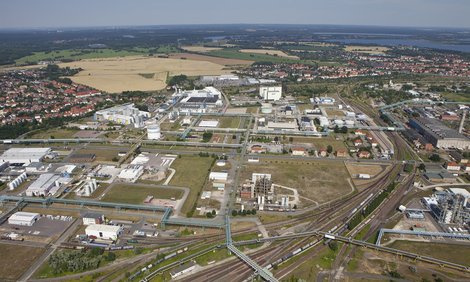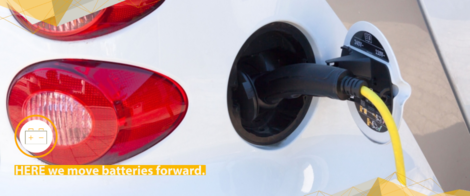A Mood of Optimism in the Chemical Industry
New materials and innovative value chains: Saxony-Anhalt is in a strong position

Saxony-Anhalt has had strong links with the chemical industry for more than 125 years and these links are repeatedly being given new impetus. Bitterfeld-Wolfen, the cradle of electrochemistry, is where processes for aluminum alloys were developed and the idea of the chemical park was first proposed more than 20 years ago. Today, companies at the chemical site, which has gradually expanded over the years, are working on the key issues of the future, such as electric mobility. The development of “new mobility” has begun to accelerate and Saxony-Anhalt is already in the fast lane, as Max Fuhr, the commercial manager of the Bitterfeld-Wolfen Chemical Park, explains: “There is a mood of optimism here, because you can’t have batteries without chemicals.”
When Max Fuhr talks about how the chemical industry in this area will grow over the next ten years, he often brings out one of Roland Zenn’s presentation slides. The graphic created by the senior purchasing manager at Farasis Energy shows the future battery boom in Europe. Arrows indicate the locations of new battery factories and Fuhr has drawn a red circle around the area that points to “Bitterfeld 2022.” That is when Farasis Energy aims to start production in the south of Saxony-Anhalt. With the factory and a center of excellence for batteries, the chemical park is developing into a location which brings together the entire cycle of battery chemistry from precursor materials and electrode manufacturing through to recycling. According to Max Fuhr: “That is the future and we are already helping to shape it here.”
“What we have to offer is relatively rare.” When he makes predictions of this kind, appropriately he is in a location designated by the Saxony-Anhalt Ministry of Economy in 2020 as one of twelve future centers of excellence in the region. The Bitterfeld-Wolfen Chemical Park covers an area of 12 km², which makes it the largest open industrial park for chemical and pharmaceutical companies in Europe. It is one of the chemical parks based on a concept developed in Saxony-Anhalt. Alongside Bitterfeld-Wolfen, the sites in Leuna, Piesteritz, Schkopau and Zeitz play a leading role in the industry by providing production companies with a wide range of services from one source and guaranteeing the rapid availability of low-cost raw materials and auxiliary materials. Max Fuhr explains that it is not only tradition which attracts global players such as Dow and Bayer and newcomers such as Farasis Energy. Fuhr, who has a degree in business administration, is convinced that “our state is one of the most attractive locations for the global chemicals industry. We can offer an excellent infrastructure, a complex materials network and extensive experience.” Now the next chapter in the success story of the chemical industry here is about to be written.
The key issue: where will the raw materials come from and be processed?
Max Fuhr does not only use the graphic with the battery factories to highlight “his” chemical park. As an energy expert, he can also explain what is currently driving the industry and why there is a mood of optimism. He says: “Electric vehicles are being given a huge boost and that is why so much is happening around batteries, which are their key component.” Europe is the second largest market in the world and could move up into first place by 2030, ahead of China. “Until now, the majority of batteries have been made in Asia,” explains Max Fuhr, “but in the future they will be produced where the electric cars are being sold.” In this context, there is one crucial question: Where will the large quantities of raw materials for the batteries come from? There are clear demands from the industry and from government for regional value chains and a low carbon footprint. “The opportunity to produce these high-performance materials here for the European battery factories represents an exciting niche market for us as a location with a focus on the future. It is in these factories that the success of the industry will be decided, value will be added on a large scale and attractive and innovative jobs will be created. All of this means that we in Bitterfeld-Wolfen and in Saxony-Anhalt as a whole are in an ideal position in Europe,” confirms Max Fuhr.
Urban mining: Turning the value chain into a closed cycle.
For him, the reasons for this are obvious: “In Saxony-Anhalt there is already a high-tech chemical industry and we have the infrastructure and the expertise.” Another point on the plus side is that companies can benefit from one another and exploit synergies to keep costs low. In addition, the region already has a “healthy, flourishing ecosystem of service providers linked to the traditional process industry.” He continues: “It’s important not to forget that more than half of our electricity already comes from renewable sources. And we have plenty of space. These are also key factors.” At the end of the regional value chain is the recycling process or as Fuhr refers to it: urban mining. Even long-lasting electric car batteries “reach the end of their useful life at some point. We are already developing chemical processes here that will allow us to recover valuable substances from old batteries and reuse them as raw materials. This will turn the value chain into a closed cycle. It’s the next step,” says Fuhr. And it will increase the importance of Saxony-Anhalt as a location for the chemical industry. Companies and research institutions based here are already working on many different areas of electric mobility, including batteries, from raw materials and testing through to finished products and back again.
“We are taking part in several discussions about new arrivals.”
Examples include companies in Bitterfeld-Wolfen such as IBU-tec advanced materials, which is developing a product for LFP battery cells, Black Magic, which produces a carbon derivative for supercapacitors, and LANXESS, which is making ion exchange resins that are also used in battery cell production. Tesvolt is a company based in Lutherstadt Wittenberg which specializes in developing innovative and sustainable energy storage solutions for industrial and commercial use and manufactures them in Europe’s first battery gigafactory. The Weinberg Campus in Halle (Saale), which is the second largest technology park in eastern Germany and also one of the Saxony-Anhalt centers of excellence, is home to a number of innovative young companies. EnSpring develops functional prototypes for new energy storage systems, while NorcSi is bringing a technology onto the market that can be used to produce cost-effective silicon electrodes for a future generation of more powerful batteries. In Sandersdorf-Brehna, the automotive industry service provider FEV has set up the world’s largest development and testing center for high-voltage batteries. At the end of 2021, the battery and fuel specialist HORIBA FuelCon will open its new building in the Ostfalen Technology Park in Barleben, which will give a further boost to the plans for an electric mobility campus there.
Max Fuhr is likely to be giving more presentations in the near future and explaining the benefits that the location has to offer. He mentions that discussions are currently underway with several companies along the value chain about moving to the area. “We want to cover all the chemical processes relating to batteries here, including lithium conversion, cathode materials and recycling,” confirms Fuhr. It is no surprise, therefore, that the Bitterfeld-Wolfen Chemical Park is currently receiving a lot of enquiries. “Turning all the added value phases of battery chemistry into a green cycle would be a world first,” says Max Fuhr. He doesn’t put all his cards on the table, but he does reveal one secret: “I am optimistic that we will be able to welcome a lithium manufacturing company here over the next few months. This is the lightest of all the metals and represents the start of an exciting new chapter for us.”
Author: Manuela Bock/IMG Saxony-Anhalt

In electromobility, the battery is of central importance as an energy storage device.
Saxony-Anhalt is ideally positioned as a location for battery cell production in Germany - from battery chemicals and material production to battery development and testing.
>> Find out more about battery cell manufacturing in Saxony-Anhalt
